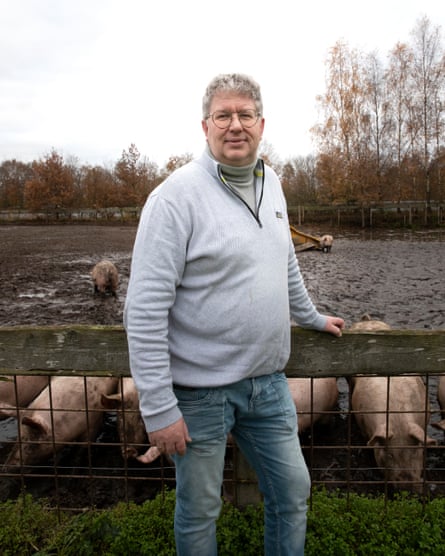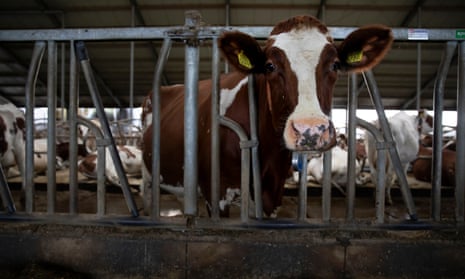The Dutch government has unveiled a €25bn (£21bn) plan to radically reduce the number of livestock in the country as it struggles to contain an overload of animal manure.
A deal to buy out farmers to try to reduce levels of nitrogen pollution in the country had been mooted for some time, and was finally confirmed after the agreement of a new coalition government in the Netherlands earlier this week.
But the plan, the first of its kind in the world, faces a huge backlash from farmers who have staged big street protests in recent years over the prospect of tough regulation and farmer buyouts. They fear permanent damage to food production in the country if too many farmers are forced to quit.
“We don’t want the system to collapse,” said Utrecht dairy farmer Marije Klever, from the Dutch young farmers’ union. She said farmers would oppose any nonvoluntary measures.
“I am a land owner, so a critical question is whether the government are allowed to push farmers out of the land. It can’t be The Hague telling farmers they must go, you need an agreement.”
While being lauded internationally as the “tiny country that feeds the world” and the continent’s biggest meat exporter, the Netherlands has been struggling at home with a pollution crisis caused by an excess of farm animals.
“We can’t be the tiny country that feeds the world if we shit ourselves,” said MP Tjeerd de Groot, from the Democrats 66 party, which is part of the coalition government in the Netherlands.
The country has the highest density of livestock in Europe – more than four times that of the UK or France – with more than 100 million cattle, chickens and pigs in total.
The animals produce manure which, when mixed with urine, releases ammonia, a nitrogen compound. If it gets into lakes and streams via farm runoff, excessive nitrogen can damage sensitive natural habitats.
The highest Dutch administrative court found in 2019 that the government was breaking EU law by not doing enough to reduce excess nitrogen in vulnerable natural areas, due to farming and industrial activities.
The 13-year multibillion-euro plan, published today, includes paying some Dutch livestock farmers to relocate or exit the industry, and helping others transition to more extensive (as opposed to intensive) methods of farming, with fewer animals and a bigger area of land.
It will start as a voluntary programme, with compensation offered to livestock farmers asked to leave. “In the end, it might be necessary to stop negotiating as a last resort, but the basis is voluntary,” said de Groot.

The end result is expected to be close to a one-third reduction in the numbers of pigs, cows and chickens in the country.
“We don’t have to feed the world, but we could show how to do it in a more sustainable way,” said organic dairy farmer Jaring Brunia, from Friesland in the north of the country.
But farming groups said they would only accept voluntary measures and want time to reduce emissions through technological innovations.
“Cars were very polluting but they had a chance to make cars less polluting with innovation. That is what we want,” said MP Caroline van der Plas, founder of the Dutch farmers party BoerBurgerBeweging (BBB).

Support for her party in rural communities has soared since it was founded two years ago, as farmers told the Guardian they felt sidelined by politicians.
“For my son, where can he find a living and know what will be allowed in 10 years? We are known as the best farmers in the world for our innovation, but if you push us all away we will have less innovative power. We need some positivity,” said Erik Stegink, a pig farmer in Bathmen, in the east of the country.
“The problem does not go away when I go away, it goes to another country,” added dairy farmer Geertjan Kloosterboer, who said farmers were ready to protest on the streets again against the measures.
Some farmers appeared more resigned to the changes, saying there was no future for intensive farming in the densely populated Netherlands. “We farm in the back yards of the city and everything is watched,” said dairy farmer Heleen Lansink-Marissen, from Haaksbergen in eastern Netherlands.
“We can’t fight for the past. We need a plan for the future and how to make money through biodiversity, carbon offsetting and a little bit less milk,” she added.
De Groot, who has previously called for a halving of livestock numbers in the Netherlands, said the government had dithered for too long on dealing with the nitrogen crisis.
“The message now is that this needs to be fixed, no matter what,” he said. “We have to move away from the low-cost model of food production. This industry is causing damage to the farmers’ business model and the environment. It’s time to restore nature, climate and air, and in some areas that may mean there is no more place for intensive farmers there.”
Brunia said many farmers wanted to change, but were locked into intensive systems with a lot of animals and debts to pay. He urged the government to spend money on helping all farmers transition, rather than for just a few to quit.
“We are used to pumping around a lot of money, milk and poo, but what is good for economics is not good for the Earth,” said Brunia.
The Netherlands is not the only country in Europe facing a crisis over livestock emissions, with observers suggesting Denmark, Belgium and Germany may soon have to consider similar action.
The UK is reportedly on track to miss its own 2020 ammonia emissions reductions target by 20% and is likely to face legal challenges from environmental health campaigners.
“We have been very good at feeding the world,” said Derk Boswijk, a Christian Democrats party MP and spokesperson for agriculture. “We can be proud. But it didn’t work out for us, so we have to change. I hope other countries will learn from what we have done wrong.”
Sign up for the Animals farmed monthly update to get a roundup of the biggest farming and food stories across the world and keep up with our investigations. You can send us your stories and thoughts at animalsfarmed@theguardian.com
